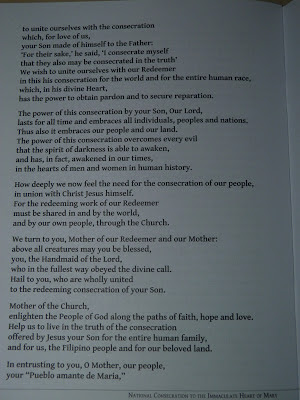Last April 21, 2013, World Day of Prayer for Vocations, Pope Francis ordained to the priesthood some deacons of the Diocese of Rome at the Vatican Basilica. Below are some pictures of the Ordination (from
News.va facebook) and the Pope's homily (from
The Vatican websibe)
The Pope's homily:
PRIESTLY ORDINATIONS
HOMILY OF POPE
FRANCIS
Vatican Basilica
Fourth Sunday of
Easter, 21 April 2013
The homily delivered by the Holy Father is based on the one that
appears in the Pontificale Romanum for the ordination of priests, with one or
two personal additions.
Beloved brothers and sisters:
because these our sons, who are your relatives and friends, are now to be
advanced to the Order of priests, consider carefully the nature of the rank in
the Church to which they are about to be raised.
It is true that God has made his
entire holy people a royal priesthood in Christ. Nevertheless, our great Priest
himself, Jesus Christ, chose certain disciples to carry out publicly in his
name, and on behalf of mankind, a priestly office in the Church. For Christ was
sent by the Father and he in turn sent the Apostles into the world, so that
through them and their successors, the Bishops, he might continue to exercise
his office of Teacher, Priest, and Shepherd. Indeed, priests are established
co-workers of the Order of Bishops, with whom they are joined in the priestly
office and with whom they are called to the service of the people of God.
After mature deliberation and
prayer, these, our brothers, are now to be ordained to the priesthood in the
Order of the presbyterate so as to serve Christ the Teacher, Priest, and
Shepherd, by whose ministry his body, that is, the Church, is built and grows
into the people of God, a holy temple.
In being configured to Christ the
eternal High Priest and joined to the priesthood of the Bishops, they will be
consecrated as true priests of the New Testament, to preach the Gospel, to
shepherd God’s people, and to celebrate the sacred Liturgy, especially the
Lord’s sacrifice.
Now, my dear brothers and sons,
you are to be raised to the Order of the Priesthood. For your part you will
exercise the sacred duty of teaching in the name of Christ the Teacher. Impart
to everyone the word of God which you have received with joy. Remember your mothers, your grandmothers,
your catechists, who gave you the word of God, the faith ... the gift of faith! They transmitted to you this gift of faith. Meditating on the law of the Lord, see that
you believe what you read, that you teach what you believe, and that you
practise what you teach. Remember too
that the word of God is not your property: it is the word of God. And the Church is the custodian of the word
of God.
In this way, let what you teach
be nourishment for the people of God. Let the holiness of your lives be a
delightful fragrance to Christ’s faithful, so that by word and example you may
build up the house which is God’s Church.
Likewise you will exercise in
Christ the office of sanctifying. For by your ministry the spiritual sacrifice
of the faithful will be made perfect, being united to the sacrifice of Christ,
which will be offered through your hands in an unbloody way on the altar, in
union with the faithful, in the celebration of the sacraments. Understand,
therefore, what you do and imitate what you celebrate. As celebrants of the
mystery of the Lord’s death and resurrection, strive to put to death whatever
in your members is sinful and to walk in newness of life.
You will gather others into the
people of God through Baptism, and you will forgive sins in the name of Christ
and the Church in the sacrament of Penance.
Today I ask you in the name of Christ and the Church, never tire of
being merciful. You will comfort the
sick and the elderly with holy oil: do not hesitate to show tenderness towards
the elderly. When you celebrate the sacred rites, when you offer prayers of
praise and thanks to God throughout the hours of the day, not only for the
people of God but for the world—remember then that you are taken from among men
and appointed on their behalf for those things that pertain to God. Therefore,
carry out the ministry of Christ the Priest with constant joy and genuine love,
attending not to your own concerns but to those of Jesus Christ. You are pastors, not functionaries. Be
mediators, not intermediaries.
Finally, dear sons, exercising
for your part the office of Christ, Head and Shepherd, while united with the
Bishop and subject to him, strive to bring the faithful together into one
family, so that you may lead them to God the Father through Christ in the Holy
Spirit. Keep always before your eyes the example of the Good Shepherd who came
not to be served but to serve, and who came to seek out and save what was lost.

















































